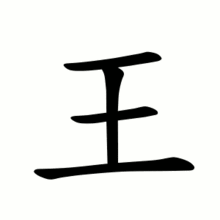You can help expand this article with text translated from the corresponding article in Chinese. Click [show] for important translation instructions.
|
 | |
| Romanization | Wáng (Mandarin) Wong (Hong Kong, Macau, Cantonese, Hakka) Wung (Shanghainese) Ong, Ung (Hokkien) Heng (Teochew) Uōng (Gan) Wang (Korean) Ō (Japanese) Vang, Uang, Vaaj (Hmong) Vương (Vietnamese) Heng (Thai) |
|---|---|
| Pronunciation | Wáng (Mandarin Pinyin) Wong4 (Cantonese Jyutping) Ông (Hokkien Pe̍h-ōe-jī) |
| Language(s) | Chinese, Korean, Japanese, Vietnamese, Taiwanese, Thai, Cantonese, Mandarin |
| Origin | |
| Language(s) | Old Chinese |
| Meaning | "King"[1] |
| Other names | |
| Variant form(s) | Wung, Bong, Vuong Wong |
| Popularity | see popular names |
Wang (/wɑːŋ/) is the pinyin romanization of the common Chinese surname 王 (Wáng). It is currently the most common surname in Mainland China, one of the most common surnames in Asia, with more than 107 million in Asia. It is the 8th name listed in the famous Hundred Family Surnames.[2][3]
A separate surname 汪 (Wāng) is also romanized as Wang.
- ^ Cite error: The named reference
BaxSagwas invoked but never defined (see the help page). - ^ "公安部统计:'王'成中国第一大姓 有9288万人 Archived 2016-03-04 at the Wayback Machine [Public Security Bureau Statistics: 'Wang' Found China's #1 'Big Family', Includes 92.88m People]." 24 Apr 2007. Accessed 27 Mar 2012.(in Chinese)
- ^ "公安部发布去年全国姓名报告,"王、李、张"姓排前三". Archived from the original on 2022-05-08. Retrieved 2020-10-19.